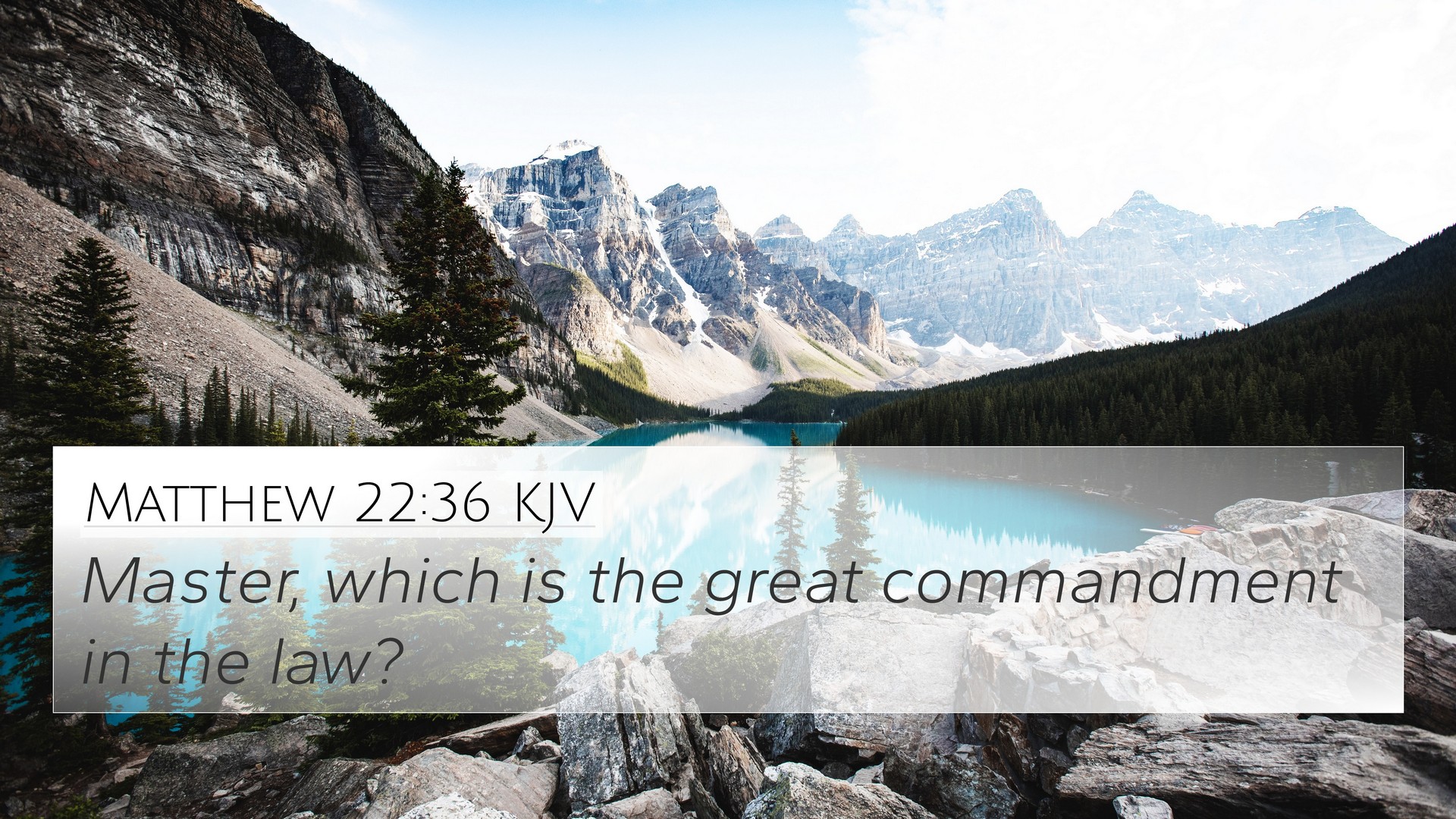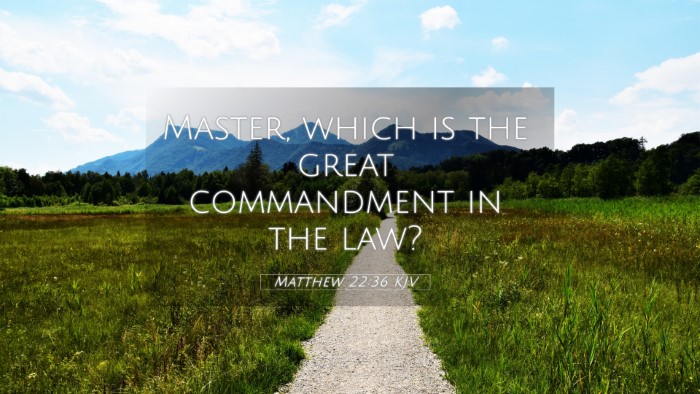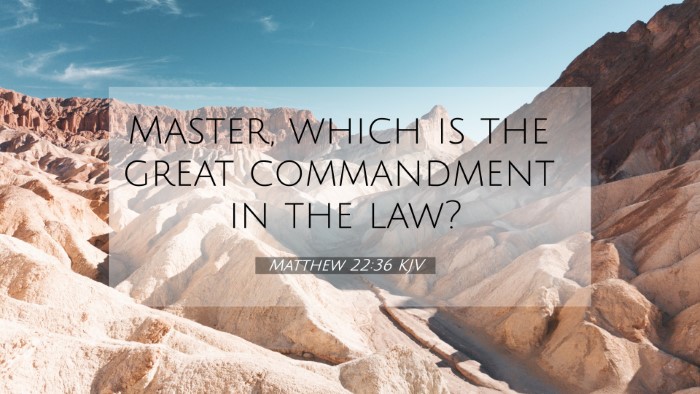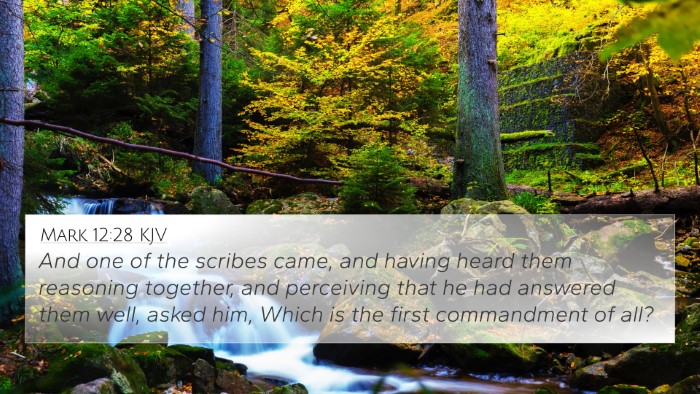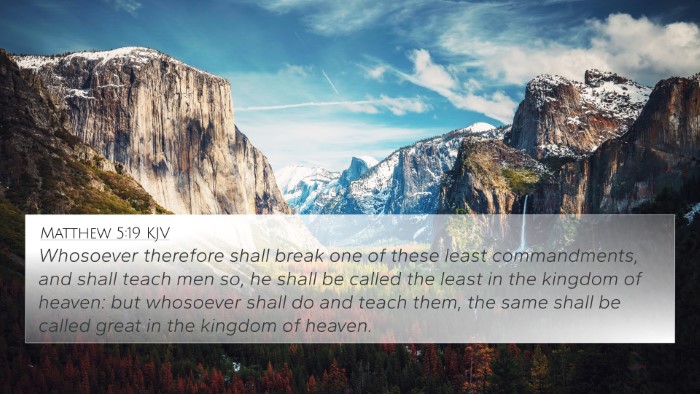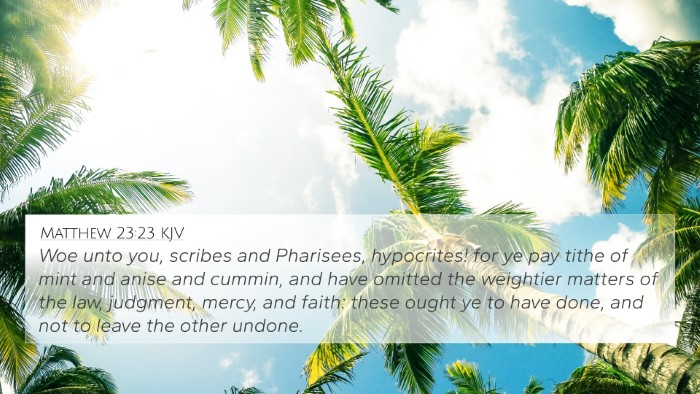Understanding Matthew 22:36
Bible Verse: Matthew 22:36 - "Master, which is the great commandment in the law?"
Summary of Biblical Meaning
Matthew 22:36 presents a pivotal moment in Jesus' ministry, where a lawyer, seeking to test him, asks about the greatest commandment in the Law. This question encapsulates the essence of the Torah and the moral imperatives contained within it. The inquiry is significant as it not only reflects the heart of Jewish law but also offers Jesus the opportunity to expound on the fundamental principles of Christian ethics.
Insights from Public Domain Commentaries
Matthew Henry: Henry emphasizes that Jesus' response reveals the heart of the law, which is love. He points out that the commandments should not merely be viewed as rules but as expressions of genuine affection towards God and fellow humans. This notion of love being central highlights the depth of Jesus' interpretation of the law.
Albert Barnes: Barnes provides a detailed examination of the context of the verse, noting that the question posed reflects the debates of the time regarding which laws were the most important. He underscores that Jesus disarms the lawyer’s intentions by redirecting the focus from a mere interpretation of law to its application in love.
Adam Clarke: Clarke discusses the philosophical implications of the commandment. He suggests that understanding the greatest commandment demands a profound reflection on the nature of God and humanity's relationship with Him. For Clarke, this inquiry and subsequent answer encapsulate the essence of Christian living.
Key Themes and Connections
This verse invites contemplation on various themes:
- Love as a Fulfillment of the Law: The idea that love is the documentation of godly living, underpinning the laws.
- Authority of Jesus: The need to recognize the authority of Christ in moral interpretation.
- The Nature of Questions in Discipleship: Understanding that questions posed in faith can lead to deeper insights into God’s desires for humanity.
Cross-References to Matthew 22:36
To deepen your understanding of Matthew 22:36, consider the following Bible verses that interconnect and support the themes presented:
- Deuteronomy 6:5: "You shall love the Lord your God with all your heart and with all your soul and with all your might."
- Leviticus 19:18: "You shall not take vengeance or bear a grudge against the sons of your own people, but you shall love your neighbor as yourself: I am the LORD."
- Mark 12:29-31: Jesus reiterates the commandment, highlighting both the love of God and neighbor as the foundation of the law.
- Romans 13:10: "Love does no wrong to a neighbor; therefore love is the fulfilling of the law."
- Galatians 5:14: "For the whole law is fulfilled in one word: 'You shall love your neighbor as yourself.'"
- 1 John 4:20: "If anyone says, 'I love God,' and hates his brother, he is a liar; for he who does not love his brother whom he has seen cannot love God whom he has not seen."
- Luke 10:27: Jesus also mentions the love of God and others in a dialogue about eternal life.
- Matthew 7:12: "So whatever you wish that others would do to you, do also to them, for this is the Law and the Prophets."
- James 2:8: "If you really fulfill the royal law according to the Scripture, 'You shall love your neighbor as yourself,' you are doing well."
- John 13:34: "A new commandment I give to you, that you love one another: just as I have loved you, you also are to love one another."
Conclusion
Matthew 22:36 serves as a cornerstone for both understanding the law of God and the nature of Christian ethics. The emphasis on love encapsulates the broader theological insights woven throughout Scripture. By cross-referencing this verse with others, we reveal a tapestry of interconnected themes rooted in love, divine authority, and the moral responsibilities of believers.
Tools for Further Study
To explore more about cross-referencing Biblical texts, consider utilizing tools such as:
- Bible Concordance
- Bible Cross-Reference Guide
- Comprehensive Bible Cross-Reference Materials
- Cross-Reference Bible Study Methods
Engaging with these resources can enhance your understanding and allow for a more enriched study of the Scriptures.
